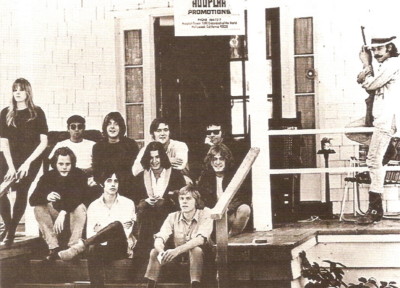American Pastimes features music recorded at an old hotel and resort in the Feather River Canyon of Northern California in 1968. These two creatively inspired albums, “Bamboo” by Dave “Snaker” Ray & Will Donicht and “Running, Jumping, Standing Still” by “Spider” John Koerner & Willie Murphy stand on their own, but are also footnotes in a larger and much more interesting story.
When Dylan's "Basement Tapes" and the Band's “Music from Big Pink” were first heard everyone in the music industry took notice. Both had been recorded in a house in the country. The agrarian collective ideal lived on, and on both sides of the Atlantic bands talked their record companies into renting large country estates or ranches in order to provide creative environments for making music. At the close of the 1967 Monterey Pop Festival, Elektra Records producer Barry Friedman (aka Frazier Mohawk - his name change was not inspired by any Native American connections or spirituality - he was hiding from the IRS) talked label owner Jac Holtzman into financing such a venture. Holtzman later blamed the heady success of the festival (which featured Hendrix, the Who, Joplin, etc.) for affecting his judgment. After failing to locate an available property in southern California, Friedman placed an ad in the L.A. Examiner and the owner of the Paxton Lodge responded. The lodge was located along the Feather River in northern California’s Sierra Nevada mountains, west of Quincy, near the small community of Keddie. Elektra took out a six month lease with an option for an additional six months. The record company would underwrite the entire venture; renovation, salaries, fuel, food, cooks and housekeeping, etc.
Friedman selected the musicians to accompany him up north in the attempt to create a productive musical community. He started with Jackson Browne, Ned Doheny and Jack Wilce who were teenage songwriters whose potential was recognized by Elektra; Browne and Wilce already had songs recorded by other artists. These writers would be nurtured, and their new songs would be developed and recorded by a cadre of musician friends. Browne, Doheny and Wilce were all supposed to create solo albums, contribute to each others recordings, and perform as a group. The three songwriters were also talented instrumentalists. Browne played guitar and piano; Doheny on guitars; Wilce played guitar, mandolin and banjo.
Other musicians taking up residence at Paxton Lodge
included veteran drummer Sandy Konikoff (who had played with Ronnie Hawkins,
the Band, and Bob Dylan), Rolf Kempf (guitar, piano, organ, accordian), and
Peter Hodgson (bass). The recording engineer was John Haeny. These resident
musicians would also be available to assist on the recordings of any other
Elektra artist who chose to record at the lodge. Friedman referred to the resident musicians as the “Los Angeles Fantasy
Orchestra.” The musicians called themselves “The Inmates.”

All of these musicians and the engineer subsequently had long careers in music, as songwriters, studio musicians, touring artists, and engineers and record producers. But in the summer of 1968 they were all in their late teens and early twenties, and with the exceptions of Friedman and Konikoff had very little studio experience.
Within a few weeks of the arrival of the musicians and equipment, even before the completion of studio renovations, calls went out to various friends, girlfriends, groupies, and hangers-on. The invited guests began to arrive and according to Browne “it was like bringing the dance hall girls to the miners.” Little work was accomplished on the solo projects and the group recordings. Between the river, the woods, the girls and the drugs there was little time for productivity. Friedman acted more like a recreation director than music producer and his young wards showed no signs of discipline. “I don’t remember much music being made” recalls Browne.
The group produced one album’s worth of material in six months. They performed it live for Elektra owner Jac Holtzman when he flew up from L.A. to check out his investment. He thought it was great at the time but acknowledges that he may have been influenced more by the environment than the actual performance. The drug-laced Cornish hens that were served for dinner and the young women who went out of their way to make him feel welcome and relaxed may have also impaired his objectivity.
When the snow began to fall on the Sierra Nevada mountain range the atmosphere at the lodge quickly disintegrated. Cabin fever and life in close proximity began to take its toll on the "inmates." Cliques formed, jealousies surfaced, and collectivity gave way to competition. Minor disagreements escalated into major confrontations. At some point, Ned Doheny was forced to leave.
As the musicians attempted to put their music on tape it immediately became apparent that they hadn’t captured lightning in a bottle; that they weren’t working well together and the music wasn’t that good. Even an act of bio-musical depravity, the invention of the “sphincterphone” by Konikoff and Haeny couldn’t help. With failure as the only option, the producer Friedman retreated to his bedroom where he spent much of December. On New Year’s Eve he left the lodge for southern California: “I fled…I just had to get away; it was life or death…It spun out of control, an incredible psychodrama." Browne also recalls running down Hwy 70 along the river in anger and frustration until he ran out of breath, and then he returned.
The recording sessions continued until the engineer threw up his hands, packed up the tapes and his dogs and split. Everyone knew the album was poorly conceived and developed. There also seems to be some confusion about whether it was a group recording or a Jackson Browne recording. It was called “Baby Browning,” named after a gravestone that someone noticed in a local cemetery and inspired by the mysterious sound of a baby's crying that was heard on one song's playback. But whether that was the album title or the band's name remains a matter of debate. Browne refers to the recordings as his “stillborn” album but the acetate copies of the recording floating around among music collectors seems to feature only three Browne songs and vocal performances which suggest that it was not just a Jackson Browne album.
In early spring of 1969 the tapes were delivered to Elektra and as expected they were rejected. Holtzman pulled the plug on Paxton Lodge and Browne, Doheny and Wilce had their contracts canceled and their publishing rights returned. The entire endeavor had cost Elektra over $75,000 ($10,000 just for damages) for the six months operation.
But there were successes. Other Elektra artists had journeyed up the Feather River Canyon to record. Said Friedman, “Many musicians passed through Paxton, I run across them to this day and they say ‘I was there,’ but I don’t remember them.” Blues guitarist Lonnie Mack made the trip and came away empty (except for a later religious conversion that he attributed in part to the behavior he witnessed at Paxton), but longtime Elektra blues artists and duo Dave “Snaker” Ray and "Spider" John Koerner each completed albums there with new partners.
Dave Ray and Will Donicht’s finished product was “Bamboo,” a psychedelic folk album which is currently out-of-print. Along with musicians from their native Minnesota, “Bamboo” also featured Konikoff and Hodgeson plus peddle steel legend Red Rhodes.
“Spider” John joined with pianist Willie Murphy (future producer for Bonnie Raitt) to complete “Running, Jumping, Standing Still” (currently issued on Red House Records). They also brought musicians with them but were joined by Wilce and Konikoff with Friedman producing. The first song of the record, “Red Palace” is about their experience at Paxton. The title refers to the resort’s one remaining neon light that turned the surrounding snow crimson at night. Rolling Stone magazine called the album “one of the most acclaimed releases of 1969…[which] blended folk, blues and jug-band music into a giddy electronic hoedown.” It was proof that experienced professionals could be productive in the pleasure palace of Paxton Lodge, at least in the winter when the lure of the river and woods didn't get in the way of sex, drugs, and rock 'n roll productivity.
After his release from Elektra, Jackson Browne continued to hang out in the L.A. music scene but he credits the recording debacle at Paxton Lodge for eventually changing his approach to music. He took the business more seriously; he gave up pot and paid for singing lessons. David Geffen signed on to be his manager and when Geffen had a difficult time getting Browne a recording contract he formed his own label, Asylum Records.
In his post-Paxton career, Ned Doheny immediately went to England where he formed a trio with Dave Mason (ex-Traffic) and Cass Elliott (ex-Mamas & Papas). Before recording with them however he returned to L.A. and he also signed with Asylum Records. He had great success as a songwriter and even recorded some Top 40 hit tunes in the 1970’s.
Jack Wilce's recording career never took
off but he did write and record a song entitled “Ballad of Baby Browning” which was
released as a single on Elektra. His backing band for both sides of the record
was the Flying Burrito Brothers along with studio heavyweights James Burton on dobro and Jim
Gordon on drums. Due to the harmonizing presence of Gram Parsons the single is
an expensive collector’s item. Ohio-native Wilce spent a decade in New
York writing commercial jingles (the very first Domino's Pizza jingle was his) and currently performs at small venues
and at folk and bluegrass festivals in the Midwest. He occasionally performs and records with old friends from California like Jackson Browne and David Crosby. Here’s a TV broadcast from 1967 that showcases Wilce’s abilities:
Sources: “Hotel California” by Barney Hoskyns, “Follow the Music: The Life and High Times of Elektra Records” by Jac Holzman, and “Becoming Elektra” by Mick Houghton.
PLAYLIST:
Noam Pilkelny “Ashland Breakdown” from Noam Pikelny Plays Kenny Baker Plays Bill Monroe
The Early Mays “Oh Babe, It Ain't No Lie” from Chase the Sun on Bird on the Wing Records
Kyle Carey “Across the Great Divide” from North Star on Americelta Records
Red Allen & Frank Wakefield “Sweetheart You Done Me Wrong” from The Folkways Years, 1964-1983 on Smithsonian/Folkways
Dan Zanes “Willy the Weeper” from Parades and Panoramas - 25 Songs Collected By Carl Sandburg for the American Songbag on Festival Five Records
The Subdudes “Why Can't I Forget About You” from Annunciation
Mountain Home “Omie Wise” from Mountain Home on Language Of Stone
Annie Lou “Haunted” from Tried And True on Annie Lou
Bill Boyd's Cowboy Ramblers “Boyd's Blues” from Top 70 Classics - The Very Best of Bill Boyd and His Cowboy Ramblers on GRR Music
Spade Cooley “I've Taken All I'm Gonna Take from You” from Top 50 Classics - The Very Best of Spade Cooley on GRR Music
Tommy Emmanual and David Grisman “Sweet Georgia Brown” from Pickin'
Tommy Emmanual “Deep River Blues medley” from Live at the Ryman
Si Kahn and the Looper Brothers “Tarpaper Shack” from Aragon Mill: The Bluegrass Sessions
Steve Lewis “Appalachian Rain” from Appalachian Rain on Hughes House
MUSIC FROM PAXTON LODGE, 1968
Spider John Koerner and Willie Murphy “Red Palace” from Running, Jumping, Standing Still on Red House Records
Spider John Koerner and Willie Murphy “I Ain't Blue” from Running, Jumping, Standing Still on Red House Records
Spider John Koerner and Willie Murphy “Old Brown Dog” from Running, Jumping, Standing Still on Red House Records
Spider John Koerner and Willie Murphy “Running, Jumping, Standing Still” from Running, Jumping, Standing Still on Red House Records
Dave Snaker Ray and Will Donicht “Girl of the Seasons” from Bamboo
Dave Snaker Ray and Will Donicht “Tree House” from Bamboo
Dave Snaker Ray and Will Donicht “Blak Beri Cheri Blooz” from Bamboo
Dave Snaker Ray and Will Donicht “The Virgin Albatross” from Bamboo
Dave Snaker Ray and Will Donicht “That's My Life” from Bamboo
Jim and Jesse “Rider in the Rain” from Country Music Heritage: Legacy of CMH Records
The Osbourne Brothers “Keep Me From Blowing Away” from Country Music Heritage: Legacy of CMH Records
The Zinc Kings “Give the Fiddler a Dram” from The Zinc Kings on Modern Primitive Music
Kenny Hall and the Sweets Mill String Band “Maggie Walker Blues” from Kenny Hall and the Sweets Mill String Band
The Strange Creek Singers “Sally Ann” from The Strange Creek Singers









